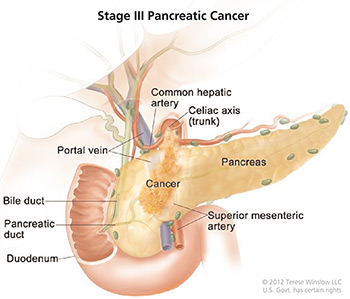- Have any questions? Contact us!
- info@dr-rath-foundation.org

Bayer’s takeover of Monsanto reportedly gets clearance in the United States
April 12, 2018
Patients prescribed antidepressant drugs discover they are highly addictive
April 16, 2018New Meta-Analysis Confirms Vitamins ‘Dramatically’ Decrease Risk Of Deadly Pancreatic Cancer

A new meta-analysis published in the journal Medicine has confirmed that vitamin intake can decrease the risk of pancreatic cancer. One of the most deadly of all cancers, pancreatic cancer has a particularly poor 5-year survival rate of just 5 percent. With chemotherapy drug treatments having consistently failed to improve on this grim statistic, new preventive approaches are urgently needed. Significantly, therefore, the new meta-analysis found that vitamins D and B12 can ‘dramatically’ reduce the incidence of this killer disease.
Published by researchers in China, the meta-analysis examines a total of 25 studies. Involving a total of over 1.2 million people, the studies were carried out in North America, Europe, East Asia, and Australia. Analysis of the data shows that daily consumption of 10 micrograms of vitamin D reduced the incidence of pancreatic cancer by 25 percent, while daily consumption of 10 micrograms of vitamin B12 reduced it by 27 percent. Positive effects of other B vitamins, as well as vitamins A, C, E and K, were also noted by the researchers.
The Cellular Medicine approach to pancreatic cancer
 Towards further improving the effectiveness of nutrients against pancreatic cancer, one obvious weakness of this meta-analysis is that it essentially only considers the preventive effects of each vitamin individually. In contrast, Dr. Rath’s Cellular Medicine approach to this disease maximizes the benefits of nutrients by combining them to take advantage of their synergistic effects. Through the proper scientific selection of nutrients and doses, this approach enables the beneficial properties of each component in the combination to be significantly increased.
Towards further improving the effectiveness of nutrients against pancreatic cancer, one obvious weakness of this meta-analysis is that it essentially only considers the preventive effects of each vitamin individually. In contrast, Dr. Rath’s Cellular Medicine approach to this disease maximizes the benefits of nutrients by combining them to take advantage of their synergistic effects. Through the proper scientific selection of nutrients and doses, this approach enables the beneficial properties of each component in the combination to be significantly increased.
A study published in 2005 by researchers from the Dr. Rath Research Institute demonstrated the effectiveness of this synergistic approach by utilizing a combination of vitamin C, the amino acids lysine, proline and arginine, and green tea extract. The researchers observed that, when used together, this group of nutrients was successfully able to reduce the growth of pancreatic cells by 62 percent. Additionally, the combination was found to completely stop the secretion of matrix metalloproteinases (MMPs), a type of enzyme produced by cancer cells that enables them to cut their way through the connective tissue surrounding tumors. All types of cancer use this specific mechanism in order to spread. As a result, the more MMPs that a cancer produces, the more malignant it will be and the shorter the patient’s life expectancy. Impressively, therefore, by blocking MMP enzymes and strengthening the surrounding connective tissue, the nutrient combination used by the Dr. Rath Research Institute scientists succeeded in reducing the potential of pancreatic cancer cells to spread by up to 87 percent.
Statistics show that around 338,000 people were diagnosed with pancreatic cancer in 2012 alone, and that the disease causes more than 331,000 deaths per year. This makes it the world’s twelfth most common malignancy and seventh leading cause of cancer mortality. As such, while orthodox medicine has clearly failed to either prevent or cure pancreatic cancer, the growing evidence that nutritional and Cellular Medicine therapies are effective against it should give hope both to millions of patients and their doctors alike. Without doubt, the sooner patients are able to take advantage of these safe and effective natural approaches, the sooner more lives will be saved and victory over cancer can become a global reality.



